Kim Hooper's Blog, page 27
June 19, 2020
Weekly Roundup: June 19
Happy Juneteenth everyone! I hate that it’s taken us so long to acknowledge this day as a society, but I’m glad we finally are. Kudos to my company for giving us the day off to reflect. I went for a much-needed run this morning. Running offers such good reflection time for me.
 As seen on my run.
As seen on my run.Quote of the week:
“…when you study history, you must always ask yourself, Whose story am I missing? Whose voice was suppressed so that this voice could come forth? Once you have figured that out, you must find that story too.” –Yaa Gyasi, Homegoing
What I’m reading:
The Vanishing Half by Brit BennettThe Conscious Parent: Transforming Ourselves, Empowering Our Children by Dr. Shefali Tsabary
What I’m listening to:
Behold the Dreamers by Imbolo Mbue
What I’m watching:
Lenox Hill (Netflix docuseries; finished it, loved it)Full Frontal with Samantha Bee (TBS; her last couple episodes have been awesome)
Writing news:
Tiny won the Silver in the General Fiction category of the 2019 INDIE Awards by Foreword ReviewsI posted “12 must-read books by Black women” on Medium and my blogI have a new essay going live on Scary Mommy next week–keep an eye outI started writing a new novel this week (yay! and eek!)Reminder: All the Acorns on the Forest Floor is coming on September 15! You can pre-order at all the usual places. Check out the early Goodreads reviews!3 things coming soon: 1) An announcement about my first non-fiction book (co-written with two therapist-friends; releasing Spring 2021); 2) An announcement about my next fiction book (coming Summer 2021); and 3) An announcement about some exciting news with my first book, People Who Knew Me
What I’m talking about:
Concerns about increases in COVID-19 cases (this NPR article is a good read)Trump’s removal of nondiscrimination protections for LGBTQ people when it comes to health care and health insurance (NPR article)The inequities in maternal care for Black women. As stated here: “Birth work is political & racial disparities in healthcare exist and are prevalent today. Black women experience added barriers and obstacles to accessing healthcare, prenatal care, and end up with worse outcomes”The mental health crisis in our country right now (see Washington Post article here); I mean, it makes sense. Just look at the previous 3 bullets. The world is very upsetting right now
What I’m grateful for:
Therapy. I have an amazing therapist and I am so grateful for her. I truly believe every single one of us could benefit from therapy (especially now!). There seems to be less stigma attached to therapy these days, but I do think people resist it because it requires so much effort–finding the right person, figuring out the finances (#insurancesucks), etc. If you need someone to talk to, push through the barriers as much as you can. When our mental health is compromised, so many other things become infinitely harder. The world is hard right now. For me, therapy keeps me strong so I can continue to offer the world my best self.
The post Weekly Roundup: June 19 appeared first on Fiction Writing Blog.
June 18, 2020
12 must-read books by Black women
You may have seen this going around social media:
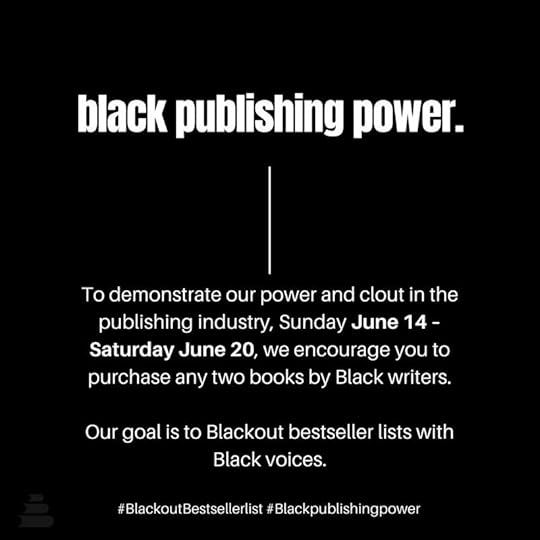
I’ve heard a lot of people express a desire for something tangible they can do to support the movement, and this is something that’s easy and fulfilling. I’ve been focusing on supporting more Black businesses, in general, and each Black author is a small business. I love to read, so win-win.
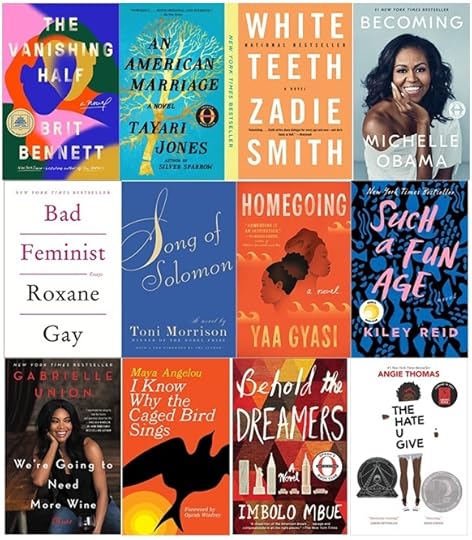 12 must-read books by Black women.
12 must-read books by Black women.Because I’m a loud-and-proud feminist, I wanted to highlight 12 books I’ve loved written by Black women. There’s a mix of fiction and nonfiction here–truly something for everyone. If you have other favorites, I’d love to hear.
The Vanishing Half by Brit Bennett
I’m reading this book right now, but I already love it. From the synopsis: “The Vignes twin sisters will always be identical. But after growing up together in a small, southern black community and running away at age sixteen, it’s not just the shape of their daily lives that is different as adults, it’s everything: their families, their communities, their racial identities. Many years later, one sister lives with her black daughter in the same southern town she once tried to escape. The other secretly passes for white, and her white husband knows nothing of her past. Still, even separated by so many miles and just as many lies, the fates of the twins remain intertwined. What will happen to the next generation, when their own daughters’ storylines intersect?”
An American Marriage by Tayari Jones
This book came out in 2018, and I read it last year. There’s a quote from it that I wrote down because I loved it so much: “There are too many loose ends in the world in need of knots.” From the synopsis: “Newlyweds Celestial and Roy are the embodiment of both the American Dream and the New South. He is a young executive, and she is an artist on the brink of an exciting career. But as they settle into the routine of their life together, they are ripped apart by circumstances neither could have imagined. Roy is arrested and sentenced to twelve years for a crime Celestial knows he didn’t commit. Though fiercely independent, Celestial finds herself bereft and unmoored, taking comfort in Andre, her childhood friend, and best man at their wedding. As Roy’s time in prison passes, she is unable to hold on to the love that has been her center. After five years, Roy’s conviction is suddenly overturned, and he returns to Atlanta ready to resume their life together.”
White Teeth by Zadie Smith
I’ve read a few of her books, but this one is my favorite. From the synopsis: “At the center of this invigorating novel are two unlikely friends, Archie Jones and Samad Iqbal. Hapless veterans of World War II, Archie and Samad and their families become agents of England’s irrevocable transformation. A second marriage to Clara Bowden, a beautiful, albeit tooth-challenged, Jamaican half his age, quite literally gives Archie a second lease on life, and produces Irie, a knowing child whose personality doesn’t quite match her name (Jamaican for “no problem”). Samad’s late-in-life arranged marriage (he had to wait for his bride to be born), produces twin sons whose separate paths confound Iqbal’s every effort to direct them, and a renewed, if selective, submission to his Islamic faith. Set against London’ s racial and cultural tapestry, venturing across the former empire and into the past as it barrels toward the future, White Teeth revels in the ecstatic hodgepodge of modern life, flirting with disaster, confounding expectations, and embracing the comedy of daily existence.”
Becoming by Michelle Obama
I listened to this book on Audible and highly recommend that experience. This book doesn’t need any summarizing–we all know what it’s about. I’ll just repeat what so many others have said: this reveals Michelle Obama as a woman like so many of us, juggling motherhood, marriage, work, and passion. It’s truly uplifting in its universality.
Bad Feminist by Roxane Gay
I recently learned via the #PublishingPaidMe thread on Twitter that Roxane Gay was only paid $15,000 for this book, which is absurd. It’s one of the best contemporary feminist books out there, featuring essays that are both funny and insightful. From the book: “I embrace the label of bad feminist because I am human. I am messy. I’m not trying to be an example. I am not trying to be perfect. I am not trying to say I have all the answers. I am not trying to say I’m right. I am just trying—trying to support what I believe in, trying to do some good in this world, trying to make some noise with my writing while also being myself.”
Song of Solomon by Toni Morrison
My mom reminded me the other day how lucky I was to go to a high school that had many minority authors on the required reading list. This was one of those required books and I loved it so much that I’ve re-read it twice (maybe three times? Can’t remember). The synopsis is here (but it really doesn’t do the book justice; you have to read it): “Milkman Dead was born shortly after a neighborhood eccentric hurled himself off a rooftop in a vain attempt at flight. For the rest of his life he, too, will be trying to fly. With this brilliantly imagined novel, Toni Morrison transfigures the coming-of-age story as audaciously as Saul Bellow or Gabriel García Márquez. As she follows Milkman from his rustbelt city to the place of his family’s origins, Morrison introduces an entire cast of strivers and seeresses, liars and assassins, the inhabitants of a fully realized black world.”
Homegoing by Yaa Gyasi
I just finished this book and LOVED it. It follows one family through several generations on different continents. Somehow, the author manages to make each character feel like the main character. Here is a quote I wrote down: “…when you study history, you must always ask yourself, Whose story am I missing? Whose voice was suppressed so that this voice could come forth? Once you have figured that out, you must find that story too.”
Such a Fun Age by Kiley Reid
This book seems “light,” but there is social commentary running throughout. From the synopsis: “Alix Chamberlain is a woman who gets what she wants and has made a living, with her confidence-driven brand, showing other women how to do the same. So she is shocked when her babysitter, Emira Tucker, is confronted while watching the Chamberlains’ toddler one night, walking the aisles of their local high-end supermarket. The store’s security guard, seeing a young black woman out late with a white child, accuses Emira of kidnapping two-year-old Briar. A small crowd gathers, a bystander films everything, and Emira is furious and humiliated. Alix resolves to make things right.”
We’re Going to Need More Wine: Stories That Are Funny, Complicated, and True by Gabrielle Union
I have to agree with this description: “A powerful collection of essays about gender, sexuality, race, beauty, Hollywood, and what it means to be a modern woman.” What I loved about this is how relatable Union is. Listening to this on Audible felt like talking with a girlfriend.
I Know Why the Caged Bird Sings by Maya Angelou
This is another book I read in high school and then re-read years later. It’s a beautiful coming-of-age story about Maya Angelou’s early life and the strength she developed in the face of racism and trauma.
Behold the Dreamers by Imbolo Mbue
I just started listening to this book and it’s fantastic so far. It’s about a Cameroonian immigrant couple living in Harlem and their pursuit of the American Dream. I’m going for a long run tomorrow morning and can’t wait to listen more.
The Hate U Give by Angie Thomas
This is classified as a Young Adult book, but it’s a great read for adults too. The book centers around 16-year-old Starr Carter who witnesses the fatal shooting of her childhood friend, Khalil, at the hands of a police officer. It’s a story that is sadly reminiscent of today’s headlines, and the book explores so many of the themes that are at the forefront of today’s social unrest. Next up for me is watching the movie.
The post 12 must-read books by Black women appeared first on Fiction Writing Blog.
June 12, 2020
Weekly Roundup: June 12
**Apologies to subscribers for not receiving my last few posts via email. It’s been fixed**
It’s been another emotional week. I had a good cry this morning. The pandemic, the protests… there are so many things right now. And my cat ran away.
Quote of the week:
“Most people resist change, even when it promises to be for the better. But change will come, and if you acknowledge this simple but indisputable fact of life, and understand that you must adjust to all change, then you will have a head start.” –Arthur Ashe (quoted in this week’s newsletter from James Clear)
What I’m reading:
Homegoing by Yaa GyasiThe Conscious Parent: Transforming Ourselves, Empowering Our Children by Dr. Shefali Tsabary
What I’m listening to:
Dear Girls: Intimate Tales, Untold Secrets, and Advice for Living Your Best Life by Ali Wong (Audible; much needed comic relief)
In Recovery with Dr. Nzinga Harrison: “Racism is an addiction” (podcast)
What I’m watching:
Time: The Kalief Browder Story (Netflix docuseries; this was probably the most moving and disturbing documentary I have ever seen. It will stay with me for a long, long time)
Last Week Tonight with John Oliver: On the police (HBO, but also on YouTube)
Lenox Hill (Netflix docuseries; my friend, Ameena Din, was the production accountant!)
Writing news:
Tiny celebrated its first birthday yesterday! And it was recently named a 2019 Foreword Indies Finalist in general fictionReminder: All the Acorns on the Forest Floor is coming on September 15! You can pre-order at all the usual places. Check out the early Goodreads reviews!3 things coming soon: 1) An announcement about my first non-fiction book (co-written with two therapist-friends; releasing Spring 2021); 2) An announcement about my next fiction book (coming Summer 2021); and 3) An announcement about some exciting news with my first book, People Who Knew Me
What I’m talking about:
Racial injustice in the publishing world (see the hashtag #Publishingpaidme on Twitter, and read this article in Poets & Writers) The sobering reality of our future with COVID-19 (read this in-depth interview with a top epidemiologist)This article about how current times are exposing cracks in friendships (something I mentioned last week and Ashley Abramson wrote about for Medium)This survey of 500 epidemiologists, talking about when they expect to resume certain activities. Only 30% said they would resume daycare/camp/school this summer, which leaves me wondering what they are doing for long-term child care
What I’m grateful for:
Running. It’s my go-to for head clearing, and I’ve needed a lot of head clearing lately. If I go out early enough, I get some pretty cool photos too.
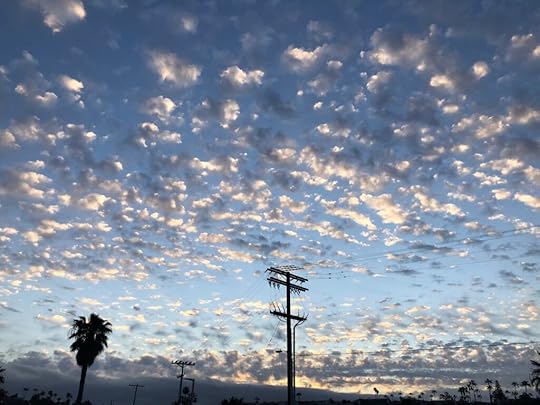
The post Weekly Roundup: June 12 appeared first on Fiction Writing Blog.
June 5, 2020
Weekly Roundup: June 5
This has been one of the most troubling weeks in recent times (and that’s saying a lot considering we are in the midst of a global pandemic).
Quote of the week:
“White people need to do a lot of introspective work to understand the ways in which they personally contribute to, benefit from and tolerate white supremacy.” –Leslie Mac (quoted in this Refinery29 piece by Stephanie Long)
What I’m reading:
What I Told My Daughter: Lessons from Leaders on Raising the Next Generation of Empowered Women by Nina Tassler (editor)Between the World and Me by Ta-Nehisi Coates
I’ve read a ton of essays and articles this week. Here are a few that really opened my eyes:
“White Privilege: Unpacking the Invisible Knapsack” by Peggy McIntosh“75 Things White People Can Do for Racial Justice” by Corinne Shutack“The Case for Reparations” by Ta-Nehisi Coates“How White Women Can Use Their Privilege to End Racism” by Tikia K.Hamilton
What I’m listening to:
The Hate U Give by Angie Thomas (Audible)Unlocking Us: Brené Brown with Ibram X. Kendi on How to Be an Antiracist (Podcast)Trevor Noah on George Floyd, the protests, and the dominoes of racial injustice and police brutality (on YouTube) Grit: The power of passion and perseverance, Angela Lee Duckworth (TED Talks)Katherine Ryan: Telling Everybody Everything (this episode on pregnancy loss)
What I’m watching:
13th (Netflix documentary)Explained: Racial Wealth Gap (Netflix/YouTube)I Know This Much Is True (HBO)Mrs.Fletcher (HBO) (finished it, loved it)
Writing news:
I published this essay on Medium: “How I’ll Raise My Daughter to Promote Racial Justice“Reminder: All the Acorns on the Forest Floor is coming on September 15! You can pre-order at all the usual places. Check out the early Goodreads reviews! Stay tuned: I know, I keep stringing you along like a high school boyfriend, but I’m waiting for some things to be final before making announcements. What I can say is the cover for my first nonfiction book (out in Spring 2021) is coming any day now; and my fifth novel (out in Summer 2021) just got a title (once I confirm it’s final-final, I’ll announce!)
What I’m talking about:
The difference between equality and equity (this is a good explanation)How friendships are changing (or fading) as we judge each other’s responses to both COVID-19 and the racial conversation sparked by the death of George FloydHow COVID-19 is a big threat to women’s ability to work (and to feminism, in general) (this article sums up many of my thoughts)The things I’ll miss about quarantine life. I shared my thoughts on this a while back here. As things start to reopen, I’m feeling the self-imposed pressure to socialize more when, really, I’ve loved all the introvert time
What I’m grateful for:
My parents. As I’ve been participating in conversations about racial justice, I’ve started to see people’s true colors. I’ve realized that some people are truly raised to believe in white supremacy. It makes me grateful that my parents raised my sister and I to see all races as equal. Obviously, this doesn’t mean I’m absolved of anything; I have lived white privilege. I am part of the problem because I’ve been quietly non-racist for years. I haven’t done enough. But I am grateful that my parents raised me in a way that allows my mind to be open to the realities of my privilege (and what I can do to help ensure more racial equity).
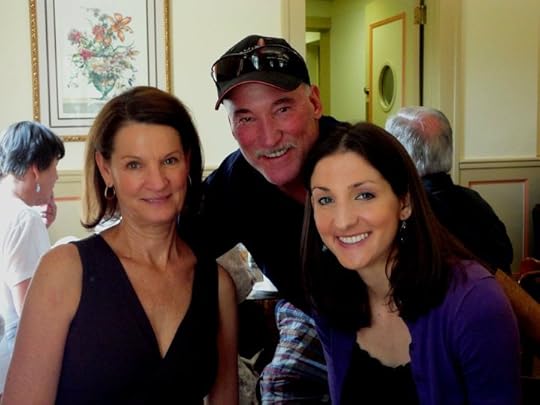
The post Weekly Roundup: June 5 appeared first on Fiction Writing Blog.
May 29, 2020
Weekly Roundup: May 29
Last Friday in May. My family is still quarantining, though the world around us seems to be reopening (for economic reasons; the statistics, at least in our area, do not show any actual slowing of the virus). Strange times, folks.
Quote of the week:
“Writing is perhaps the greatest of human inventions, binding together people who never knew each other, citizens of distant epochs. Books break the shackles of time. A book is proof that humans are capable of working magic.” –Carl Sagan, scientist, astronomer, author (quoted in James Clear’s newsletter)
What I’m reading:
A Life’s Work: On Becoming a Mother by Rachel Cusk
What I’m listening to:
The Cactus: A Novel by Sarah Haywood
“Unlocking Us” podcast (this episode and this episode)
What I’m watching:
I Know This Much Is True (HBO)
Mrs. Fletcher (HBO)
I Will Make You Mine (Amazon Prime) (Note: This is Lynn Chen’s directorial debut. I met Lynn years ago and have been following her career ever since. Congrats, Lynn!)
Writing news:
I’ve had so many essay ideas and so little time. I’ve been back to working full-time for about a month and I’m exhaustedReminder: All the Acorns on the Forest Floor is coming on September 15! You can pre-order at all the usual places. Check out the early Goodreads reviews! Stay tuned: I promise book news is coming soon. The cover for my first nonfiction book (out in Spring 2021) is coming any day now; and my fifth novel (out in Summer 2021) just got a title (!!!)
What I’m talking about:
The sad and infuriating death of George Floyd What I can do to promote racial justice (this Medium article has great ideas)The apparent end of quarantine–I have mixed feelings (maybe this is my next essay)
What I’m grateful for:
Baking. I don’t know what’s happened to me, but I was on a baking spree this week. I have become the people I hate. The other day I made GRANOLA and stored it in a giant mason jar. Today I wanted to make banana-oat breakfast bars, but the recipe called for apple sauce (which I don’t have)…so I MADE APPLE SAUCE. WHO AM I? WHAT IS HAPPENING?
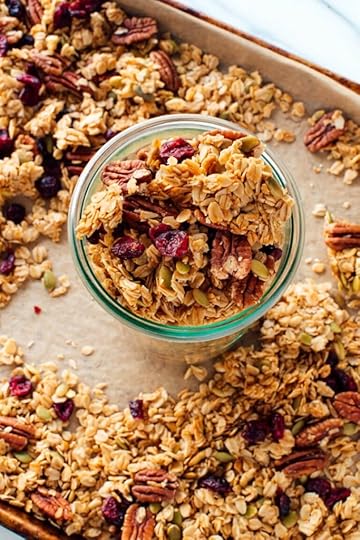 This is not my photo. I took this from the Cookie and Kate website. I used their recipe and it is AMAZING. I may never buy granola again.
This is not my photo. I took this from the Cookie and Kate website. I used their recipe and it is AMAZING. I may never buy granola again.
The post Weekly Roundup: May 29 appeared first on Fiction Writing Blog.
May 26, 2020
Careful, or you’ll end up in my novel
You’ve probably seen this meme before. And apparently there is merchandise too!
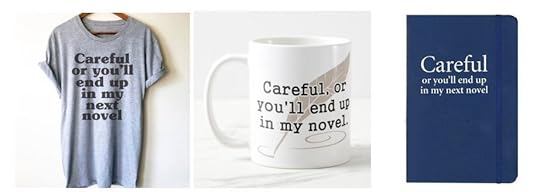 From left to right: wish.com, zazzle.com, theliterarygiftcompany.com
From left to right: wish.com, zazzle.com, theliterarygiftcompany.comI’ve always laughed at this, but it became somewhat of a more serious discussion in my life recently when two friends expressed their concerns that I would write about them (wait, does the fact that I’m writing this blog post mean I’m writing about them?!).
At first, I was baffled by this. How could they think I would write about them? Do they really think I would exploit my friendship with them for a story? But, after some thinking, I understand their fears.
The thing is, I draw on things from my real life in my fiction all the time. And, more recently, I’ve started publishing nonfiction essays (here, for example). Personally, I value being transparent and open because I have benefited greatly from others being transparent and open. In this podcast episode, one of the hosts told Glennon Doyle that her vulnerability and authenticity are gifts because they allow others to also be vulnerable and authentic. To me, this is the real value in being a writer–it’s articulating the complexities of being human so that others say, “Yes, that’s it!” and feel a little less alone in this crazy world.
In each of my novels, there are kernels of truths from my real life (some bigger than others). Nothing in my fiction is exactly as it is/was in my real life–I dramatize, exaggerate, embellish. In other words, I fictionalize. But, of course, those close to me can often spot the kernels, and I guess if they think they see themselves in those kernels, it makes them uncomfortable.
Most of the characters in my books are completely made up, not even loosely based on someone I know. There are a few who are inspired by real people, but they are usually a mix of different people–one person’s appearance, another person’s manner of speaking, another person’s sense of humor. If I feel compelled to add a real person’s trait to a character, it’s usually in a complimentary way, like paying homage to them.
Bits and pieces of my husband appear in my fiction, and he knows that and always reads what I write. He’s never once expressed discontent with a character who resembled him in some way. He knows me. He knows what writing means to me. He knows that if something I write hits a little close to home, it comes with the territory of loving me. I’m grateful for that, for his trust and for the freedom it gives me. I guess that’s why I was a bit hurt by my friends’ concerns–I thought they had the same trust in me.
I don’t know what The Writer’s responsibility is to the real people in her life. In Bird by Bird: Some Instructions on Writing and Life, Anne Lamott says this:
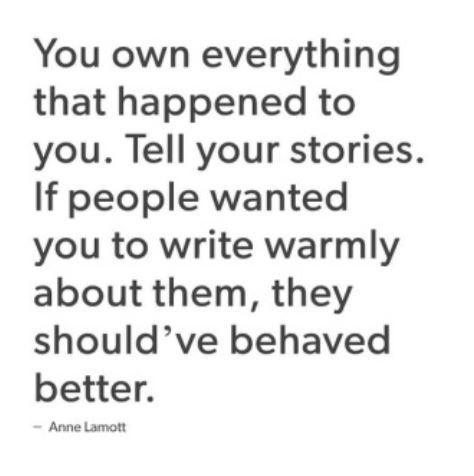 From: Tumblr
From: Tumblr Also in Bird by Bird:
“Toni Morrison said, ‘The function of freedom is to free someone else,’ and if you are no longer wracked or in bondage to a person or a way of life, tell your story. Risk freeing someone else. Not everyone will be glad that you did. Members of your family and other critics may wish you had kept your secrets. Oh well, what are you going to do? Get it all down. Let it pour out of you onto the page.”
And regarding one of her books: “Some people may have thought that this book was too personal, too confessional. But what these people think about me is none of my business.”
And: “We write to expose the unexposed. If there is one door in the castle you have been told not to go through, you must. Otherwise, you’ll just be rearranging furniture in rooms you’ve already been in. Most human beings are dedicated to keeping that one door shut. But the writer’s job is to see what’s behind it, to see the bleak unspeakable stuff, and to turn the unspeakable into words–not just into any words but if we can, into rhythm and blues.”
Then there’s this quote from Stephen King:
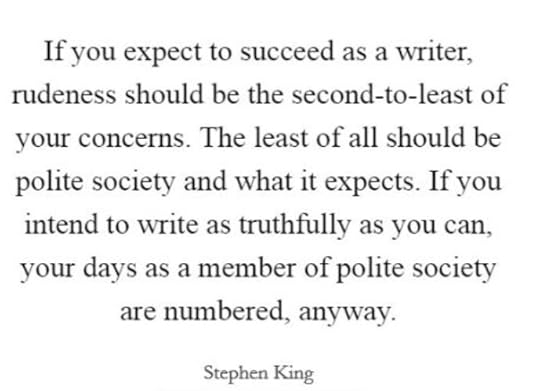 From PictureQuotes.com
From PictureQuotes.comThe writer in me says, “Yes! Write your truths. Be honest. Don’t worry what anyone thinks.” But, part of me also feels that I need to be considerate of how those truths affect others. It’s a fine line. Every writer knows that if you think too much about your readers, you will be paralyzed. There is no pleasing everyone. Someone–a friend, relative, stranger–is going to be offended, somehow. I realized this quickly after publishing my first novel and reading a Goodreads review that stated, “This is the story about the most selfish person on the planet” (that was the extent of the review).
I have also had the situation of someone thinking they saw themselves in one of my books when I really and truly did not base the character on them. So, I can’t win. I can’t help what people see, think, and feel. I can’t help what hits a nerve. In my first novel, the main character is estranged from her neglectful mother and my mom (who I am very close to) said, “She’s not somehow based on me, right?” I just laughed.
What I’ve come to see is that while I value writing that is real and raw, others may be threatened by real and raw. While I crave transparency and openness, others may fear it. I tell the stories I need to tell. The people in my life, the ones who really “get” me, understand those stories. At the end of the day, they are just that–stories.
The post Careful, or you’ll end up in my novel appeared first on Fiction Writing Blog.
May 22, 2020
Weekly Roundup: May 22, 2020
I’m not sure how it’s Friday again, but my calendar tells me it is.
Quote of the week:
“You can make the right choice and still feel sad. You can love what is and want something else.” —Nora McInerny (in her newsletter)
What I’m reading:
The Other Family: A Novel by Loretta Nyhan
What I’m listening to:
A Good Marriage: A Novel by Kimberly McCreight (on Audible)
“Unlocking Us” podcast (this episode)
“Free Cookies” podcast (this episode)
“Terrible, Thanks for Asking” podcast (this episode)
What I’m watching:
Mrs. America (Hulu)
Dead to Me (Netflix) (finished Season 2. Loved it)
I Know This Much Is True (HBO)
Hello Privilege. It’s Me, Chelsea (Netflix)
I Am Maris (Netflix)
Writing news:
I published a new essay on Scary Mommy: I Thought My Single, Childfree Friends Had It Easy During Quarantine–But I was Wrong Good Morning America (online) interviewed me about my “Mommy Wars” essay and included me in their piece Book #4, All the Acorns on the Forest Floor, is coming on September 15! You can pre-order at all the usual places. Check out the early Goodreads reviews! Stay tuned for news on my first nonfiction book (coming Spring 2021) and my next novel (coming Summer 2021)
What I’m talking about:
The need for better bereavement leave in this country (as discussed in this opinion piece in the New York Times)How COVID may lead to the biggest labor movement we’ve seen in decades (as discussed here)The Good Men Project (which is new to me and awesome)
What I’m grateful for:
My husband, even though I said to him yesterday, “You are really annoying me.” People, we’ve been cooped up together for more than 2 months and he types SO LOUDLY and his voice on work calls is BOOMING. And just when I think I can introvert (yes, it’s a verb) in peace when he falls asleep at 7pm, he starts SNORING. There are too many sounds going on for my highly sensitive soul.
But, seriously, isn’t true love being able to say “You are annoying the hell out of me” without fear of rejection or abandonment? Isn’t true love being able to be yourself even when that self is in a bitchy mood? Chris doesn’t flinch when I’m annoyed at him. He just gets me a beer. We will get through this quarantine weirdness. We’ve been through much worse.
Six years ago today, when we said “I do,” we had already been through so much together–the loss of his dad (from ALS) and the loss of his stepdad (he had a heart attack while driving on the 5 freeway). But we had no idea what was coming. We didn’t know that his mom would die just a few months after our wedding. We didn’t know that shortly after that we would have our first pregnancy loss. And then a second, and a third, and a fourth. We didn’t know that we would finally have a daughter. We didn’t know that the post-traumatic stress of all the loss would carry over into life after her birth. We didn’t know that the baby phase would challenge our marriage in ways none of the other stuff had (despite our immense gratitude for her). We didn’t know that she would become the light of our lives, baffling us every day with her persistent joy (seriously, where did this child come from?). We didn’t know that we would take a risk on buying and renovating a dream house (without killing each other!). There’s just so much we didn’t know. There’s still so much we don’t know. Uncertainty causes me a lot of anxiety, and marriage helps quell that anxiety. It’s a constant when so much else is in flux. Not that our marriage (or any marriage?) is easy. A shaman in Maui (long story) told us we have a “karmic marriage,” meaning we have hard lessons to teach each other. And that’s true. The lessons aren’t always comfortable, but we are both better because of them.
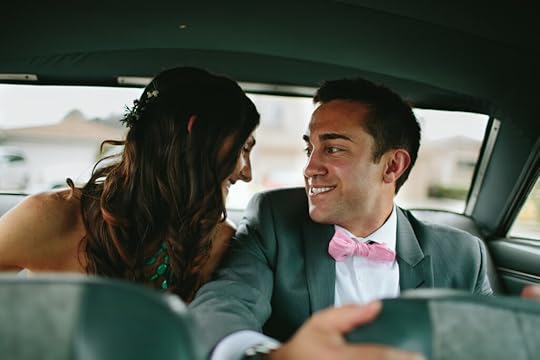
The post Weekly Roundup: May 22, 2020 appeared first on Fiction Writing Blog.
May 15, 2020
Weekly Roundup: May 15, 2020
Welcome to my first Weekly Roundup, where I review the things grabbing my attention.
Quote of the week:
“We can’t be grateful all the time. Gratitude is deeply important and healing, but this is a time where we also have to make room for complaints. There’s a reason we have ten words for ‘complaining’ in Yiddish. It’s a valve release. It’s a way to still feel like you have a say over your life when you don’t control squat.” —Esther Perel (in her newsletter, which I highly recommend)
What I’m reading:
Running on Empty No More: Transform Your Relationships with Your Partner, Your Parents, and Your Children by Jonice Webb
What I’m listening to:
The new Fiona Apple album (yes, still)
“Call Your Girlfriend” podcast (this episode)
“Sugar Calling” podcast (this episode)
“On Being” podcast (this episode)
The Child Finder: A Novel by Rene Denfeld (on Audible)
What I’m watching:
Mrs. America (Hulu)
Dead to Me (Netflix)
Becoming (Netflix)
Salmon Fishing in the Yemen (movie on DVD–yes, I still have these relics)
Writing news:
I published a new essay on Scary Mommy: ‘Mommy
Wars’ 2020: The Global Pandemic EditionI have another essay going live on Scary Mommy
next week!I’m aiming to write one piece a week on Medium, so follow me thereI recently signed a contract for my fifth
novel, to be published in summer 2021Book #4, All the
Acorns on the Forest Floor, is coming this fall! You should be able to pre-order soonComing soon: I’m going to be announcing
exciting news about my FIRST nonfiction book. Stay tuned!
What I’m talking about:
The absurdity of Jeff Bezos’ wealth
The upcoming COVID-19 antibody testing in my area
What I’m grateful for:
My new reading glasses. They. Are. Life. Changing.
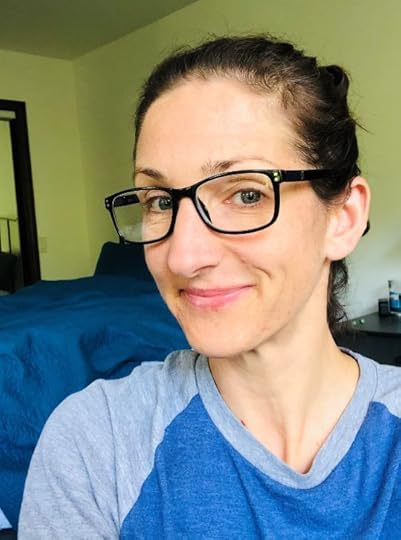
The post Weekly Roundup: May 15, 2020 appeared first on Fiction Writing Blog.
May 8, 2020
The highly sensitive writer
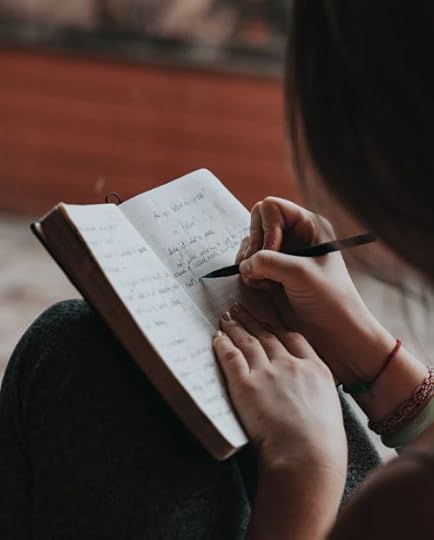 Photo by Marcos Paulo Prado on Unsplash
Photo by Marcos Paulo Prado on UnsplashThroughout my life, I have heard the following phrases: “You’re just so sensitive,” “Don’t be so sensitive,” “You’re too sensitive.” It was completely ingrained in me that this was a terrible trait, a character flaw, something I needed to “work on.”
I don’t think the people who have said those things to me were trying to be hurtful; I think they just hated seeing me go through pain (because part of being highly sensitive is feeling everything intensely, including pain). As my husband said to me: “It must be hard to be you.” He wasn’t trying to be a jerk; he just meant that it must be overwhelming to feel so much. And, he’s right. It is overwhelming. But I wouldn’t have it any other way. As Elaine Aron writes in The Highly Sensitive Person: “I am deeply moved by things, I’d hate to miss the intense joy of that.”
During my twenties, I kind of knew who I was, but I was convinced that person needed lots of improvements (one of which was to be less sensitive). In my thirties, I got to know myself better and started to doubt my ability to just “turn off” my sensitivity. I figured I’d hide it from others, but I was fine with it myself. Since I’ve turned 40, I’ve decided that I really like myself and I’m actually proud of my sensitivity–no need to hide it. Now, if someone says, “You’re so sensitive,” I say, “Thank you!” The world needs sensitive people. Another quote from Aron on highly sensitive people (HSPs): “We are the writers, historians, philosophers, judges, artists, researchers, theologians, therapists, teachers, parents, and plain conscientious citizens.”
I’ve embraced being highly sensitive because I know that’s what makes me a good writer. And the world needs writers. I need writers. I have looked to books to help me not only turn inward, but to turn outward by understanding the perspectives and feelings of others.
After reading Aron’s book, I’ve identified a few concrete reasons why HSPs make good writers (and why most writers are probably HSPs):
1. We notice subtle differences. HSPs are very aware of changes to their environment. They are at risk for overstimulation all the time. This can be a burden, but it comes in handy as a writer. It’s easy for me to pick up on nuances in daily interactions with people, for example, and that translates to creating realistic dialogue between characters, describing subtle changes in facial expressions, etc.
2. We have rich emotional lives. I think if my husband were to sit and write about a character experiencing the death of a loved one, he would write, “She was sad. The end.” My husband is not an HSP; not even close. HSPs have so much color in their lives. There are about a million shades of sad, so we task ourselves with coming up with a million ways to describe those shades. Science has shown that HSPs actually experience greater emotional “vividness” because of more activity in a certain area of the brain. I think this is what led me to writing in the first place. I felt so much and I needed a way to express all of it. I learned from a very young age that talking about what I felt just led to being called “too sensitive.” So, I wrote.
3. We see things in new, different ways. Good writing (or good art, in general) is something that feels fresh but, at the same time, familiar. It’s connecting readers to unknown parts of themselves in ways they haven’t been connected before. For me, books are all about this connection. As a writer, I do my best to articulate something that I sense is a very human feeling, something deep and maybe dark that all of us have inside on some level. By articulating that, I hope to touch a reader who says, “Yes, that’s exactly it.” I hope that person feels a little less alone. As a reader, this is what I seek–to feel less alone with all the feelings swirling inside me. I believe only HSPs can facilitate this type of connection. It’s something we do innately, but something that is hard to put into words or “teach.”
I’ll close with another quote from Aron:
“HSPs do more of that which makes humans different from other animals: We imagine possibilities.”
And thank goodness for that.
The post The highly sensitive writer appeared first on Fiction Writing Blog.
May 1, 2020
Nonfiction books that blew my mind
Hey, look, it’s May and we’re still in the midst of a global pandemic. I figured it was time for another reading recommendations list. I had a few people request a nonfiction version, so here it is. I’ve been reading more and more nonfiction over the years, usually because I’m researching something for a book and then go down a rabbit hole. There is so much to learn. I’m by no means a “nonfiction expert”; these titles are very slanted toward my unique interests. But, what unites all of these is that they are very well-written.
Relationships:
Attached: The New Science of Adult Attachment and How It Can Help You Find—and Keep—Love – Amir Levine,MD and Rachel Heller, MA
Decoding Love: Why It Takes Twelve Frogs to Find a Prince, and Other Revelations from the Science of Attraction — Andrew Trees
The Five Love Languages: The Secret to Love that Lasts — Gary Chapman
Parenthood and Family:
All Joy and No Fun: The Paradox of Modern Parenthood — Jennifer Senior
Bringing Up Bébé – Pamela Druckerman
How Not to Hate Your Husband after Kids – Jancee Dunn
True crime:
American Fire: Love, Arson,and Life in a Vanishing Land – Monica Hesse
The Fact of a Body: A Murder and a Memoir – Alexandria Marzano-Lesnevich
The Good Nurse: A True Story of Medicine, Madness and Murder – Charles Graeber
I’ll Be Gone in the Dark:One Woman’s Obsessive Search for the Golden State Killer – Michelle McNamara
In Cold Blood – Truman Capote
Lost Girls: An Unsolved American Mystery – Robert Kolker
Missoula: Rape and the Justice System in a College Town – Jon Krakauer
People Who Eat Darkness: The True Story of a Young Woman Who Vanished from the Streets of Tokyo—and the Evil That Swallowed Her Up – Richard Lloyd Parry
Women’s Issues:
All the Rage: Mothers, Fathers, and the Myth of Equal Partnership — Darcy Lockman
Bad Feminist: Essays –Roxane Gay
The Beauty Myth: How Images of Beauty are Used Against Women — Naomi Wolf
Bitch in the House: Women Tell the Truth About Sex, Solitude, Work, Motherhood, and Marriage — Cathi Hanauer, editor
Drop the Ball: Achieving More By Doing Less — Tiffany Dufu
Three Women – Lisa Taddeo
Why We Can’t Sleep: Women’s New Midlife Crisis – Ada Calhoun
Health and Medicine:
Being Mortal: Medicine and What Matters in the End – Atul Gawande
Eating Animals –Jonathan Safran Foer
Gut: The Inside Story of Our Body’s Most Underrated Organ by Giulia Enders
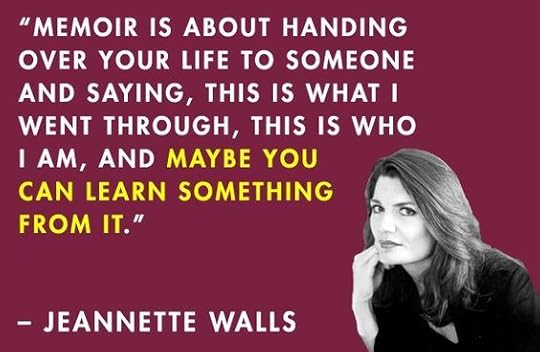
Memoir:
An Exact Replica of a Figment of my Imagination – Elizabeth McCracken
A Beautiful, Terrible Thing: A Memoir of Marriage and Betrayal – Jen Waite
Becoming — Michelle Obama
The Big Tiny: A Built-It Myself Memoir — Dee Williams
Brain on Fire: My Month of Madness – Susannah Cahalan
Dry — Augusten Burroughs
Running with Scissors — Augusten Burroughs
Everything is Horrible and Wonderful: A Tragicomic Memoir of Genius, Heroin, Love and Loss — Stephanie Wittels Wachs
– Hyeonseo Lee
The Glass Castle — Jeannette Walls
Good Talk: A Memoir in Conversations – Mira Jacob
Her – Christa Parravani
High Achiever: The Incredible True Story of One Addict’s Double Life — Tiffany Jenkins
I Am, I Am, I Am: Seventeen Brushes with Death – Maggie O’Farrell
It’s Okay to Laugh (Crying is Cool Too) – Nora McInerny
No Happy Endings – Nora McInerny
Land of Enchantment — Leigh Stein
Lit — Mary Karr
A Mother’s Reckoning: Living in the Aftermath of Tragedy – Sue Klebold
My Lovely Wife in the Psych Ward – Mark Lukach
Once More We Saw Stars – Jayson Greene
Orange is the New Black: My Year in a Women’s Prison – Piper Kerman
The Rules Do Not Apply – Ariel Levy
The Rules of Inheritance – Claire Bidwell Smith
To Shake the Sleeping Self: A Journey from Oregon to Patagonia, and a Quest for a Life with No Regret – Jedidiah Jenkins
The Sound of Gravel – Ruth Wariner
The Still Point of the Turning World — Emily Rapp
An Unquiet Mind: A Memoir of Moods and Madness –Kay Redfield Jamison
Untamed — Glennon Doyle
The Valedictorian of Being Dead: The True Story of Dying Ten Times to Live –Heather Armstrong
Wave – Sonali Deraniyagala
What I Talk About When I Talk About Running – Haruki Murakami
When Breath Becomes Air – Paul Kalanithi
You’ll Grow Out of It – Jessi Klein
You Will Not Have My Hate – Antoine Leiris
Celebrity:
The Bedwetter: Stories of Courage, Redemption, and Pee — Sarah Silverman
Born a Crime: Stories from a South African Childhood – Trevor Noah
The Girl With the Lower Back Tattoo – Amy Schumer
I’m Fine…And Other Lies – Whitney Cummings
Is Everyone Hanging Out Without Me? (And Other Concerns) – Mindy Kaling
Life Will Be the Death of Me…and You Too! – Chelsea Handler
This Will Only Hurt a Little – Busy Philipps
Yes Please – Amy Poehler
Self-Help, Spirituality, Psychology, Science, Special Interest, Kitchen Sink:
After This: When Life is Over, Where Do We Go? — Claire Bidwell Smith
Big Magic: Creative Living Beyond Fear – Elizabeth Gilbert
Blink: The Power of Thinking Without Thinking — Malcolm Gladwell
Outliers: The Story of Success – Malcolm Gladwell
The Tipping Point: How Little Things Can Make a Big Difference — Malcolm Gladwell
Hit Makers: The Science of Popularity in an Age of Distraction – Derek Thompson
The Life-changing Magic of Not Giving a F*ck: How to Stop Spending Time You Don’t Have with People You Don’t Like Doing Things You Don’t Want to Do – Sarah Knight
Maybe You Should Talk to Someone: A Therapist, Her Therapist, and Our Lives Revealed – Lori Gottlieb
Modern Loss: Candid Conversations About Grief. Beginners Welcome. – Rebecca Soffer and Gabrielle Birkner
The Paradox of Choice — Barry Schwartz
Quiet: The Power of Introverts in a World that Won’t Stop Talking — Susan Cain
Smoke Gets In Your Eyes& Other Lessons from the Crematory — Caitlin Doughty
Stiff: The Curious Lives of Human Cadavers – Mary Roach
Tiny Beautiful Things: Advice on Love and Life From Dear Sugar – Cheryl Strayed
Toxic Success: How to Stop Striving and Start Thriving — Paul Pearsall
We Are the Weather: Saving the Planet Begins at Breakfast – Jonathan Safran Foer
What Made Maddy Run: The Secret Struggles and Tragic Death of an All-American Teen – Kate Fagan
The post Nonfiction books that blew my mind appeared first on Fiction Writing Blog.



